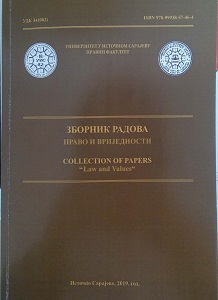Ефикасност система управноправне заштите у Републици Македонији
The Efficiency of the System of the Administrative Legal Protection in the Republic of Macedonia
Author(s): Iskra Akimovska-Maletić, Dragan Gocevski
Subject(s): Law, Constitution, Jurisprudence, Public Administration, Public Law
Published by: Правни факултет Универзитета у Источном Сарајеву
Keywords: System of administrative legal protection;Efficiency;Public sector;Republic of Macedonia;
Summary/Abstract: The authors evaluate direct as well as indirect influence of the factors of the efficiency of the system of administrative legal protection in the Republic of Macedonia. The legal and institutional frameworks of the public institutions which provide administrative legal protection have been analyzed: the autonomous state organs which decide in the second instance of the administrative procedure, the Administrative Court, as well as the Higher Administrative Court.The independent variables are the factors of internal efficiency of the institutions involved: the number of employees in the institution’s services, the number of decision-makers (members of the commission or judges), the number of newly formed cases, the number of cases resolved in one year and the number of unresolved cases in one year.The working hypothesis of the work is that institutional efficiency achieved by adequate human resources and internal work allocation (independent variables) affects the overall system efficiency (of all institutions providing legal assistance in administrative cases), if the communication channels between institutions are well established, and ICT systems are effectively applied (intervention variables).The research questions are: (1) whether independent variables affect the efficiency of institutions equally and consistently independent of the form of the organization; (2) whether the presence of prescribed deadlines or quotas differentially affects the institutional effectiveness and quality of decisions (intervening variables); and (3) whether systemic predictability and stability decline with frequent changes in the legal framework, due to the time required and the (human and material) resources of institutions applying the regulations concerned to adapt to legal changes.
- Page Range: 187-205
- Page Count: 19
- Publication Year: 2019
- Language: Serbian
- Content File-PDF

